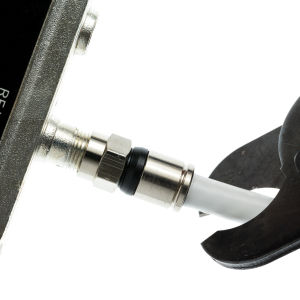The heads of two trade groups representing some of the biggest providers in cable TV plan to sue the Federal Communications Commission if the agency compels providers to make their programming accessible to third-party devices.
During a conference call Thursday National Cable and Telecommunications Association President Michael Powell told reporters the FCC is stepping beyond its legal authority with the proposed rulemaking, advanced during a commission vote in February.
“An agency of limited jurisdiction has to act properly within that jurisdiction,” Powell, a former FCC chairman, said. “What they’re proposing exceeds the statutory parameters of what they’re required to operate under.”
The agency voted along partisan lines to advance the proposal to compel cable providers like Comcast and DirecTV to make their video content accessible by third-party devices, and give consumers the opportunity to purchase a set-top box from a company like Google instead of renting one from the provider.
While Article 629 of the Communications Act states the commission “shall” ensure consumers have access to competitive options in the pay-TV navigation device market — the justification frequently cited by FCC Chairman Tom Wheeler — it does not give the agency specific authority over providers to mandate the specifications or creation of a new device or service.
“If they stay on that course and insist on adopting rules and orders that attempt to put their technical design as a legal mandate, yes, we would seek legal redress in the court as is our right to do,” Powell said, adding the agency doesn’t have “unbridled plenary power to roam around markets and … fix inconveniences everywhere they find them.”
The trade group hired former U.S. Solicitor General Ted Olson and Helgi Walker of Gibson Dunn to lead the likely legal battle against the rules. Walker represented the telecommunications industry in its recent fight against the FCC’s net neutrality rules.
American Cable Association president and CEO Matthew Polka backed Powell’s dubious legal assessment of the proposal. Both groups represent some of the largest service providers and programmers in the U.S., including Time Warner Cable, Cox, Charter and Comcast.
Comcast moved to circumvent the FCC proposal entirely this week by announcing a partnership with Samsung and Roku to give subscribers access to their Comcast content via an app, available on Samsung smart TVs and Roku streaming devices.
The announcement marks a major step away from the near-$20 billion set-top box market by the largest cable provider in the U.S., and gives subscribers the option to ditch the devices Americans pay on average $231 a year to lease.
“While we do not know all of the details of this announcement, it appears to offer only a proprietary, Comcast-controlled user interface and seems to allow only Comcast content on different devices, rather than allowing those devices to integrate or search across Comcast content as well as other content consumers subscribe to,” the FCC responded in a Wednesday statement.
Powell said the statement implies the agency is seeking to go beyond unlocking the box and regulate the services of multichannel video programming distributors (MVPDs), since Comcast’s app “would be a complete answer to what 629 requires.”
Instead, he argued, the regulations will allow companies like Google to offer third-party devices and services and “monetize — to great profit — somebody else’s private property.”
Netflix, Amazon and Hulu along with devices like Apple TV, Roku and Amazon Fire demonstrate not only competition in the market, but the future of the market itself in IP-based devices and apps, not boxes, according to Powell and Republican FCC Commissioner Ajit Pai, who made the same argument.
“How many more boxes does it take to declare that the market is trying to solve the problem?” Powell said. “Every problem does not empower an FCC-directed solution.”
Press secretary for the FCC Kim Hart responded to allegations the rules will necessitate the need for a second box to meld technical specifications or interfere with providers’ copyrighted material.
“Nothing in the proposal requires a mandated technical design or requires pay-TV providers to re-engineer their networks,” Hart said. “In fact, many MVPDs have already started the process of making information and content streams available through their own apps. The chairman’s proposal simply opens that information to competitive devices and apps.”
Hart said third party device manufacturers would have to abide by licensing terms set down by MVPDs, similar to the way CableCARDs are authorized.
“Copyright protections and remedies will remain fully intact,” Hart said. “The Copyright Office’s procedures for enforcing copyright will remain intact, and content creators retain all of their right to utilize those remedies.”
FCC Chairman Tom Wheeler has pointed to fees charged for set-top boxes as a reason to open the market. A recent study, however, offers evidence that municipally-owned cable providers charge the same rates or higher than commercial providers like Comcast and DirectTV.
The FCC will cease hearing comments on the set-top box regulations Friday.

